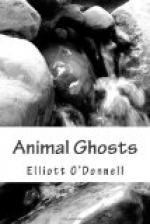“At this, O’Donnell, I turned cold. I had lived long in India. I had seen their so-called juggling, had experienced also strange cases of telepathy, and knew quite sufficient of their intimacy with the supernatural elements to be afraid.
“‘You must keep the young sahib safe,’ Cushai said, ’and the white lady. I wish it hadn’t been Nahra.’
“I took his advice. My boy, Eric, was more closely supervised than ever, and as to my wife, I begged and entreated her not to move from the house until the tiger was dead, and I searched for it everywhere.
“The dry season passed, the wet came, and my work still kept me in Seconee. At times there came to us rumours of the man-eater—of another victim—but it never visited our bungalow, where the bright rifle leaned against the wall waiting for it.
“I certainly did meet with slight misfortunes, which the more timid might have put down to the working of the curse.
“My little finger was squashed in the laying down of a rail, and Eric had several bouts of sickness.
“It was nearly a year after the leper’s death that alarming rumours of a man-eater having been at work again were spread about us. Several niggers were carried off or badly bitten, and the wounded showed symptoms of the loathsome disease so well known and feared by us all—leprosy.
“I knew from that it must be the same tiger.
“‘The tiger is near,’ someone would cry out, and a stampede among the native workmen would ensue.
“‘Why the white tiger?’ I asked Cushai.
“‘Because, sahib,’ he replied, ’the leprosy has made it so! Tigers, like men, and all other animals, go white even to their hair. I have not told them the story, sahib; they only know it must have caught the leprosy. To them Nahra is still living.’
“Then, O’Donnell, when I thought of what was at stake, and of all the hideous possibilities the presence of this brute created, I took my rifle and went out to search for it. In the evenings, when the dark clouds from the mountains descended and the wind hissed through the jungle grass, I plodded along with no other companion than my Winchester repeater—searching, always searching for the damned tiger. I found it, O’Donnell, came upon it just as it was in the midst of a meal—dining off a native—and I shot it twice before it recovered from its astonishment at seeing me. The second shot took effect—I can swear to that, for I took particular note of the red splash of blood on its forehead where the bullet entered, and I went right up to it to make sure. As God is above us, no animal was more dead.
“‘The curse won’t come now, Cushai,’ I said, laughing. ’I’ve killed the white tiger.’
“‘Killed the white tiger, sahib! Allah bless you for that!’ Cushai replied.
“’But don’t laugh too soon. Nahra was a clever man, wonderfully clever; he did not speak empty words,’ and as his eyes wandered to the dark hills again I fancied a shadow darted along the sky, and the curse came back to my ears.




